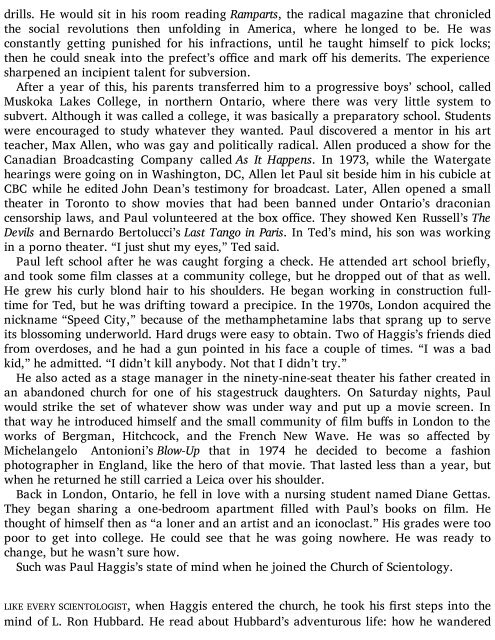going-clear-scientology-hollywood-and-the-prison-of-belief-by-lawrence-wright-2
going-clear-scientology-hollywood-and-the-prison-of-belief-by-lawrence-wright-2
going-clear-scientology-hollywood-and-the-prison-of-belief-by-lawrence-wright-2
Create successful ePaper yourself
Turn your PDF publications into a flip-book with our unique Google optimized e-Paper software.
drills. He would sit in his room reading Ramparts, <strong>the</strong> radical magazine that chronicled<br />
<strong>the</strong> social revolutions <strong>the</strong>n unfolding in America, where he longed to be. He was<br />
constantly getting punished for his infractions, until he taught himself to pick locks;<br />
<strong>the</strong>n he could sneak into <strong>the</strong> prefect’s oce <strong>and</strong> mark o his demerits. The experience<br />
sharpened an incipient talent for subversion.<br />
After a year <strong>of</strong> this, his parents transferred him to a progressive boys’ school, called<br />
Muskoka Lakes College, in nor<strong>the</strong>rn Ontario, where <strong>the</strong>re was very little system to<br />
subvert. Although it was called a college, it was basically a preparatory school. Students<br />
were encouraged to study whatever <strong>the</strong>y wanted. Paul discovered a mentor in his art<br />
teacher, Max Allen, who was gay <strong>and</strong> politically radical. Allen produced a show for <strong>the</strong><br />
Canadian Broadcasting Company called As It Happens. In 1973, while <strong>the</strong> Watergate<br />
hearings were <strong>going</strong> on in Washington, DC, Allen let Paul sit beside him in his cubicle at<br />
CBC while he edited John Dean’s testimony for broadcast. Later, Allen opened a small<br />
<strong>the</strong>ater in Toronto to show movies that had been banned under Ontario’s draconian<br />
censorship laws, <strong>and</strong> Paul volunteered at <strong>the</strong> box oce. They showed Ken Russell’s The<br />
Devils <strong>and</strong> Bernardo Bertolucci’s Last Tango in Paris. In Ted’s mind, his son was working<br />
in a porno <strong>the</strong>ater. “I just shut my eyes,” Ted said.<br />
Paul left school after he was caught forging a check. He attended art school briey,<br />
<strong>and</strong> took some lm classes at a community college, but he dropped out <strong>of</strong> that as well.<br />
He grew his curly blond hair to his shoulders. He began working in construction fulltime<br />
for Ted, but he was drifting toward a precipice. In <strong>the</strong> 1970s, London acquired <strong>the</strong><br />
nickname “Speed City,” because <strong>of</strong> <strong>the</strong> methamphetamine labs that sprang up to serve<br />
its blossoming underworld. Hard drugs were easy to obtain. Two <strong>of</strong> Haggis’s friends died<br />
from overdoses, <strong>and</strong> he had a gun pointed in his face a couple <strong>of</strong> times. “I was a bad<br />
kid,” he admitted. “I didn’t kill anybody. Not that I didn’t try.”<br />
He also acted as a stage manager in <strong>the</strong> ninety-nine-seat <strong>the</strong>ater his fa<strong>the</strong>r created in<br />
an ab<strong>and</strong>oned church for one <strong>of</strong> his stagestruck daughters. On Saturday nights, Paul<br />
would strike <strong>the</strong> set <strong>of</strong> whatever show was under way <strong>and</strong> put up a movie screen. In<br />
that way he introduced himself <strong>and</strong> <strong>the</strong> small community <strong>of</strong> lm bus in London to <strong>the</strong><br />
works <strong>of</strong> Bergman, Hitchcock, <strong>and</strong> <strong>the</strong> French New Wave. He was so aected <strong>by</strong><br />
Michelangelo Antonioni’s Blow-Up that in 1974 he decided to become a fashion<br />
photographer in Engl<strong>and</strong>, like <strong>the</strong> hero <strong>of</strong> that movie. That lasted less than a year, but<br />
when he returned he still carried a Leica over his shoulder.<br />
Back in London, Ontario, he fell in love with a nursing student named Diane Gettas.<br />
They began sharing a one-bedroom apartment lled with Paul’s books on lm. He<br />
thought <strong>of</strong> himself <strong>the</strong>n as “a loner <strong>and</strong> an artist <strong>and</strong> an iconoclast.” His grades were too<br />
poor to get into college. He could see that he was <strong>going</strong> nowhere. He was ready to<br />
change, but he wasn’t sure how.<br />
Such was Paul Haggis’s state <strong>of</strong> mind when he joined <strong>the</strong> Church <strong>of</strong> Scientology.<br />
LIKE EVERY SCIENTOLOGIST, when Haggis entered <strong>the</strong> church, he took his rst steps into <strong>the</strong><br />
mind <strong>of</strong> L. Ron Hubbard. He read about Hubbard’s adventurous life: how he w<strong>and</strong>ered


